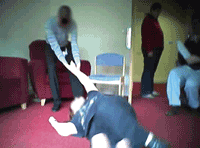
Learning disability experts have today urged David Cameron to bring an end to hospital placements for the client group in a blueprint to prevent abuse and improve care following the Winterbourne View case.
Eighty-six experts and organisations from the sector have signed an open letter to the prime minister calling for wholesale reform of services to ensure high quality care for people with learning disabilities.
It said existing inquiries into Winterbourne View and related issues, including a serious case review and an internal review of the Care Quality Commission’s role, “will not be enough” to ensure necessary changes to services, and that a clear, resourced government-led programme was needed.
The letter warned that the government’s Valuing People Now agenda to modernise learning disability support was slipping off local agencies’ radars because of ministers’ decision to scrap the team of civil servants that provided support for implementation.
The signatories include many of the leading voices in learning disabilities, including former government national director for learning disabilities Rob Greig, now chief executive of the National Development Team for Inclusion; Mencap campaigns and policy head David Congdon; and former CQC learning disability lead Fiona Ritchie.
They also include leading charities, academics, service user groups and advocacy organisations.
Key demands include:
• That local commissioners should be prevented from commissioning services in learning disability hospitals through new guidelines.
• This should be backed by a two-year national programme to develop high-quality local alternatives to hospital care.
• NHS and council commissioners should review their commissioning competence.
• The CQC should develop a more effective system for monitoring service quality that encourages improvement.
• All people placed in hospital care or away from home should have access to skilled, independent advocacy, funded by commissioners.
“While the organisations that particularly failed in allowing the abuse at Winterbourne View should be held to account for their failures, focusing only on them would be a mistake. The underpinning issue is one of the overall service and system design – hence the need for government to take a lead. Without the type of actions we suggest, there is a very real risk of similar things happening again, elsewhere.”
The Department of Health has pledged to review evidence coming from all the post-Winterbourne inquiries and consider an independent probe.
Responding to the letter, a DH spokesperson said: “We can only share the distress of the authors following the terrible events at Winterbourne View and their determination to prevent the risk of others facing similar abuse. All the issues and actions outlined in the letter will be considered fully in the Department of Health review. We need the full facts of what happened before deciding what actions are needed next.”
What do you think? Join the debate on Winterbourne View on CareSpace
Keep up to date with the latest developments in social care. Sign up to our daily and weekly emails
Related Stories
Preventing abuse of adults with learning disabilities in the wake of the Winterbourne View scandal


 Family help: one local authority’s experience of the model
Family help: one local authority’s experience of the model  ‘I spent the first three months listening’: how supportive leadership can transform children’s services
‘I spent the first three months listening’: how supportive leadership can transform children’s services  How senior leaders in one authority maintain a culture of excellence
How senior leaders in one authority maintain a culture of excellence  How staff support ensures fantastic outcomes for children and families
How staff support ensures fantastic outcomes for children and families  Workforce Insights – showcasing a selection of the sector’s top recruiters
Workforce Insights – showcasing a selection of the sector’s top recruiters 

 Facebook
Facebook X
X LinkedIn
LinkedIn Instagram
Instagram
Comments are closed.